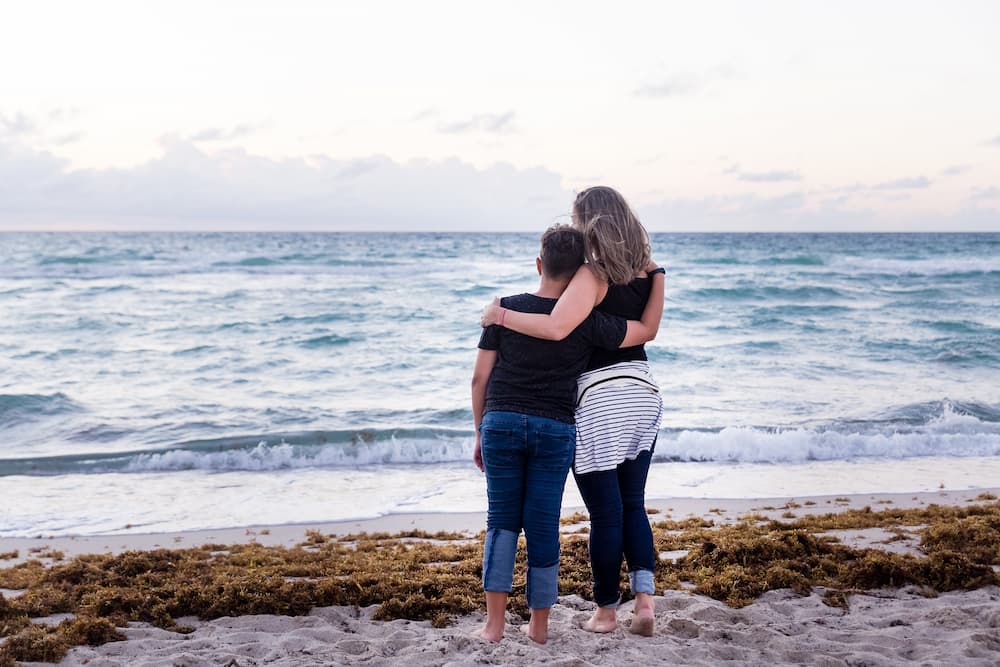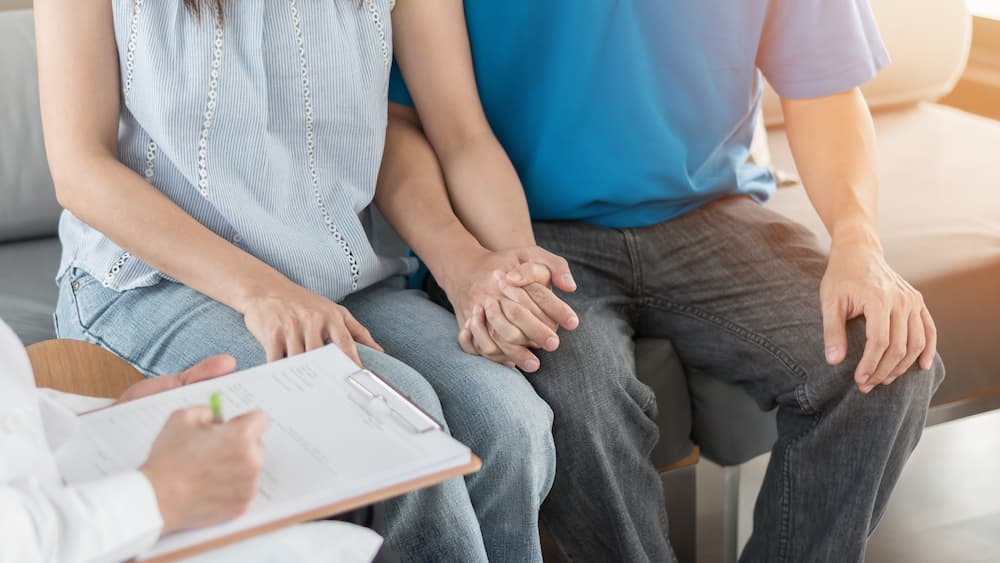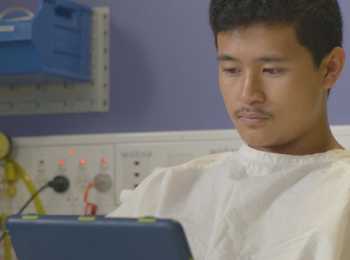Contents
Part 2
What's grief?
We often only think about grief as something we feel after someone dies. But actually, grief is the normal reaction we feel in response to any kind of loss.
You have probably already experienced many losses since your parent was diagnosed with cancer. You may have lost your normal life, or lost contact with some of your old friends, or missed out on an opportunity to go on a planned holiday. Any of these losses can be really upsetting and it can feel like your life will never be the same.
It’s also possible to feel grief when you know you are about to lose something that is important to you, before it happens. This is called “anticipatory grief” and often happens when someone you love is expected to die.
Waiting for the death to happen - and knowing you are helpless to stop it - can be just as overwhelming and painful as after the death has occurred. It can be a really confusing time, with many mixed feelings and you might not be sure how you’re supposed to act.
Maybe you think that everyone, including you, should be sad and crying all the time and that there will be no smiles or laughter.

But this isn’t the case. It’s not all black and depressing, there will be good days and bad days. It’s OK to make the most of the good days and still have a bit of fun sometimes.
Everyone in your family is experiencing their own feelings of loss and grief, but they may be showing it in different ways. They may also be trying to hide it. You might find it really scary or upsetting to see your parents so stressed. And you might miss the way things used to be. But grief is normal and things will eventually settle down.
As much as it may not feel like it now, the world in fact doesn’t end and you do survive it – somehow. Life won’t be the same, but there will still be life.
“I’d see beauty in the world, but also the bad stuff.
You go back, you go forward. It sucks, but there’s no right way.”Andrew
"One thing I wish I’d known at the start was that normality does start to come back into your life."
Lisa
It can be important that you try to understand and get a handle on your grief so that you have the energy to make the most of your time with your parent and say the things you need to say.
"I would tell someone else in my situation to relax and ask for help wherever you can. You need to have more understanding for yourself and remember its just one rough patch. This isn’t your whole life and you just need to get through this one bit, there is so much good ahead."Lizzie
Top Tips
Find someone who is easy to talk to and tell them about your worries and fears. When your feelings are out in the open, you don’t need to hold onto them.
Letting it out
"Sometimes if it was too much I would have some time out listening to music or doing some art and sometimes I just had to get out of the house and go to my friend’s house."
Amy
When you are living with the stress of cancer in your life, it’s really important that you find a way to let your feelings out and take your mind off the situation. You might be tempted to keep your emotions inside so that you don’t cause everyone else around you extra stress by seeing how worried you are.
But bottling your feelings up doesn’t make them go away. In fact, they will probably only grow stronger. Being worried and frightened all the time can make your mind foggy and your body tense and tired. This makes it even harder to manage through this difficult time.
Managing your strong feelings won’t be quick and easy, but it is definitely possible. Sometimes it may not feel like it, but you WILL get through this.
There are heaps of things you can do to give yourself a bit of an outlet and help you feel more in control of your feelings.
Everyone deals with stuff in different ways. You might have already tried some of these things and find they didn’t work. Keep trying, you will find something that helps you feel better.

Take time to do things that relax you.
"For me it was playing guitar. Even just getting away for 5 minutes to have your own space and clear your head."Peta
Here are some ideas:
- Talk about it. Putting your feelings into words can make them seem more manageable. Don’t try to deal with this on your own. It doesn’t have to be someone from your family or friends, it can be anyone. It may really help to see a professional, like a counsellor or social worker who understands a lot about grief and loss
- Listen to music. Choose a song that describes how you are feeling, turn it up and have a good sing, a yell or a cry. You can also use music to change how you are feeling. Listen to songs that make you feel relaxed and happy. You could also write your own songs or change a few words to a song you like to express how you feel.
- Cry. Give in to the waterworks; it can be a big relief.
- Exercise. Exercise can release the “feel good” hormones in your body. Make a playlist for your iPod and go for a walk or run. Even some simple stretches can help. When things are getting crazy at home, it can help if you keep doing your normal activities, like sport or dancing.
- Take a long shower. Sing, cry or scream while you’re in there.
- Get creative. No one’s expecting a masterpiece, but getting arty can be really relaxing. You could try drawing, painting, photography, scrapbooking, collage or digital art. Getting started is often the hardest part. You could try to show how you are feeling now, or your favourite memory with your parent. Or nothing related to anything at all. Just draw the cat.
“Cry if you want to.
Don’t worry about what people think, they’ll deal.”Erin
- Learn something new. Ever wanted to try the guitar? Salsa dancing? Yoga? Learning a new skill can help you take your mind off things.
- Write stuff down. A long ramble in a journal or blog might be just what you need. You could also write poems, stories or letters to your parents.
- Read, watch, play. It’s OK to zone out sometimes with TV, movies, books, radio, magazines, board games or computer games.
"I watched a lot of movies and TV shows. Focusing on these fictitious stories somehow helped me escape reality and forget about my problems."Melissa
- Take a break from it all. Go out with your friends and have a laugh and talk about different things. You’re still allowed to enjoy yourself. Don’t feel guilty for wanting your own life.
- If you’re religious, pray.
- Punch a pillow. Or chuck a tantrum on your bed. You have a right to be p*ssed off, but it’s best not to take it out on other people.
- Meditate. Even just taking one minute a few times a day to breathe deeply can release some of the stress and fear from your body. Find a quiet place, sit comfortably and just focus on your breath. If your mind starts to wonder, just keep bringing your thoughts back to your breath until that is all you are thinking about.
- Set goals. It can help to have things to look forward to. You don’t have to dream up where you’ll be when you’re 65, you could just think about what you’d like to achieve by the end of the month or year. It could be things about your family or relationships, jobs or education. Think about why you want to achieve something and then write down an achievable action you will do to make sure you get there.
- Get a bit philosophical. It might sound a bit funny at first, but taking time out to ponder the ‘big picture’ might help you get your head around things.
"Escaping into novels was good for a while.
I used to drive out to the beach and just sit there and cry or pray, it was calming and so beautiful there."Sarah

Try this activity:
Three things:
I wish weren’t in my life anymore:
1.
2.
3.
I really like and appreciate about my life:
1.
2.
3.
I would like to have in my life that I don’t have now:
1.
2.
3.
I can do or change to make things in my life better:
1.
2.
3.
One word or sentence:
To describe you before your parent had cancer:
To describe you now:
To describe cancer:
When it's all too much
Sometimes, feelings can be so strong, confusing and out of control that you just don’t feel like you are coping at all.
It doesn’t mean that you are weak, crazy or flawed if things are getting on top of you and you want to escape from it all. This happens to everyone from time to time.
You might feel like you can’t say that you’re not coping because you feel you have to be strong for your parent. But your feelings are important too.
If you can recognise the warning signs that things are becoming too much, there are things you can do to help you feel better.

Signs you’re not coping…
- Behaving badly – Throwing tantrums, swearing and talking back to your parents, running away or skipping school can all be ways to hide how hurt and afraid you are. Acting out can also get you a bit of attention when everyone’s so focused on cancer that you feel abandoned. Things might feel so hard right now that you just want to act like a little kid again. This is a normal reaction to stress. But everyone is feeling pretty strained right now, so it might help if you let people know when you are in a bad mood so they don’t take your outbursts personally.
"I had a lot of trouble with my feelings. It was all about Dad at home.
But I was getting ill myself, I was on anti-depressants and I binge ate as a way of coping. This was especially distressing to me because I was enthusiastic about health and ftness, but when I tried to stop I would be overwhelmed by a bombardment of emotion."Lizzie
- Using drugs or alcohol – This might seem like a good way to block out the hard feelings. But it really is only a short-term escape and can actually make the stresses of your parent’s illness even harder to handle. When you’re drunk or high you can say or do things you don’t really mean – and sometimes don’t even remember. You might look back with regret one day if you spend the time you do have left with your parent in a bit of a haze.
- Hurting yourself and others – It’s normal to feel angry when your parent has cancer. But there are safe ways to vent it and using violence or deliberately hurting yourself can cause you and your relationships permanent damage.
"I went cuckoo. I ran away.
I was bitchy, like a brat. I thought, I’ll do what I want!"Erin
- Using dating and sex to get close to people and ease the pain – While it’s OK to have relationships, hooking up with people before you are ready or with more than one person can put you at risk, both emotionally and physically.
"I started dating any boy that would go out with me in attempt to fill this big hole that Dad had left. I felt I needed a supportive male in my life. At this time I pushed away all my female friends and focused all my attention on boyfriends."Melissa
- Withdrawal – You will need some time to yourself every now and again. But you should not try to go through this alone. Your worries and wonders can grow into big fears when you shut yourself off from others altogether.
- Depression - You will feel sad and down when your parent is approaching end-of-life. But if the sad feeling goes on for a long time or hurts so deeply that it’s hard for you to enjoy anything at all, you might be “depressed”.
Signs of depression include feeling miserable, tired and crying all the time; changes to how much you sleep and eat; losing interest in the things you used to like; and feeling hopeless or like you will never be happy again.Depression is very common. It is nothing to feel guilty or ashamed of.
It is not permanent, but it is not something that you can just “snap out of” either. It is really important to tell someone about it. You will probably have to work at it before it will get better. Trying to get active and do things you enjoy will help you to reduce your depression.
There is no easy way to go through this. Be kind to yourself let yourself make mistakes. Don’t punish yourself for your behaviour when you are stressed. No one is perfect in these situations.
“I would tell someone else in my situation to relax and ask for help wherever you can.
Because I had lived with the situation for a while, I started to forget it was unique and be hard on myself for not coping…You need to have more understanding for yourself and remember this isn’t your while life and you just need to get through this one bit, there is so much good ahead.”Lizzie

It's crazy at home
"It was stressful at home. Everyone was uptight, upset.
We all had to pull together and not complain that we had to do the housework. You just do it."Peta
Cancer can mess with all parts of your life and really change things at home. Your routines will probably change, your relationships might become more strained - or your family might be drawn closer together.
In the later stage of a serious illness, you might feel like your normal life has been stolen from you. You might have to take on a lot more responsibilities and not get to do your usual activities as much. There might be a crowd of people around wanting to help out. Maybe it’s been a while since you had a home-cooked meal.
“At home, because our Mum didn’t live with us, the house cleaning and maintenance was up to us.
The house was always very messy. We had to help out with things, like making Dad’s breakfast and giving him morning and evening pills. I wasn’t very efficient, tended to forget his coffee, drop things, bring things in cold.”Lizzie
"I was only eight and I had a great amount of responsibility. For example, I made myself dinner, I had to get myself to bed, and sometimes Mum got so tired I got up and had to help my Dad."
Belinda
Even if you’ve been living with cancer for a while, most of us find it really hard to deal with such massive changes in our lives. It’s a normal reaction to resent what is happening and it may take a while to get used to the new situation. Eventually, things will settle down and your family will adjust and start to establish new routines and plans for the future. Things may not go back to exactly the way they were before, but it may begin to feel like a new kind of “normal”.
Some of these things might start to sound familiar:
You have to take on extra responsibilities.
You might have to pick up more chores at home, like cleaning, cooking or looking after younger brothers and sisters. You may also be expected to help with your parent’s care.
Most of the time you might not mind and you probably just get on with it. But it’s OK to wish that sometimes you could just go out and do normal fun things.
"I had to take on a lot of responsibilities around the house, in particular tasks like mowing the lawn and others that usually a Dad would do around the house. Also helping Mum with such tasks as washing, cleaning, ironing, etc. It was really hard as I was only 16 and none of my friends had these responsibilities, so I did feel a bit hard-done by! I have now grown up and realised that by helping Mum with these little things while she is at work will allow her to spend more time with us when she is at home and prevent her from becoming too stressed."Amy
"I had to be careful around Dad cos he had gotten so weak.
I was used to my big strong Dad mucking around playfighting with us, but that couldn’t happen."Eloise
Your relationship with your unwell parent changes.
You may find that it becomes difficult to be around your parent as their illness progresses. It can be scary to see them become so weak or in pain and you might prefer to stay away. Or there may be changes to their energy levels or behaviour and they may find it harder to interact with you. You may feel particularly lonely or sad if they are your only parent.
Your relationship with your other parent changes.
Like you, they are probably experiencing a whole range of difficult and confusing emotions. They will be worried about your sick parent as well as stressing about you and your siblings, the bills, work and what will happen in the future. They might not be around as much and even when they are they may seem tired, distracted and always focused on other things.
If you are starting to feel really lonely or neglected at home, you could ask if you could spend some time with another relative or family friend once in a while.
"Mum had to start working fulltime. As she hadn’t worked since before I was born, it was very difficult for her at first. It was also very difficult for my brother and I as we had always had at least one parent at home to welcome us after school. Mum would not get home from work for another 3 hours. Things just didn’t feel right."Melissa
“I think our family kind of became happier. It sounds so cheesy, but everything happens for a reason.
All the good things that happened after to this were a response to the bad…I really think everyone in my family are better people now.”Erin
Your relationships with siblings change.
If you have brother or sisters, they might be a really important source of support. They are going though this too and may be the only ones who really get how hard it is. But if you never got along well with your siblings, the stresses of cancer may not change that. Everyone in your family will deal with stress and fear in different ways and you may need a truckload of patience to prevent you from losing your cool.
Roles in the family might change, too. Older siblings might start becoming really bossy and protective, which can be frustrating. Or younger siblings might look up to you to look after them while your parents are distracted and you might resent having to be the strong one all the time. You may almost feel like you have become the parent.
If you are having a really hard time dealing with the changes at home, it’s important to talk about it with someone. A counsellor or social worker can give you lots of advice. There are contacts in the back of this book of people and places to go for help.

Your family is drawn closer.
A crisis can really bring people together and make them realise what is important. Many young people appreciate the extra time they spend with their family in the end stages of their parent’s illness and find that relationships became stronger as they take on dying together.
But every family is different and don’t think you’re doing anything wrong if it doesn’t happen in yours.
You get an army of visitors.
Lots of family and friends might stop by to help with the housework or cook you meals. You know they are just trying to help, but sometimes you might wish you had your privacy back and more time alone with your parent, particularly if you don’t know the helpers very well. (They may be really important people to your parents, however, even if you don’t know them.)
"I thought - you don’t have the right to be here. You weren’t there through the big life-changing journey."Andrew
You miss out on doing your normal things.
Everything might be about looking after your parent and your normal activities might not seem so important any more. Or there just might not be the time.
"We had to be flexible with commitments because of Dad’s doctor’s appointments and trips to the hospital. Sometimes we had to go to friends or families at strange times because Dad would need to go to hospital. Sometimes we couldn’t go out because Dad wasn’t working and we didn’t have much money."
Amy
It might seem like your life has been turned upside down and things will never settle down. But, eventually, they will.
Many families find that maintaining as normal a routine as possible can help everyone deal with the changes that will happen as your parent approaches end of life.
This is obviously a really, really hard time for everyone, so try to work together and remember that it’s normal to stuff up sometimes. Everyone will be doing their best in a very difficult situation.
"Once my parent became ill, I wasn’t allowed to invite friends around. I also felt scared to expose my friends to the full extent of what was going on at home. I was too scared to introduce my friends to my Mum who had no hair."
Chris
"Everyone turned up but I didn’t really know anyone.
There were so many randoms."Amar


















